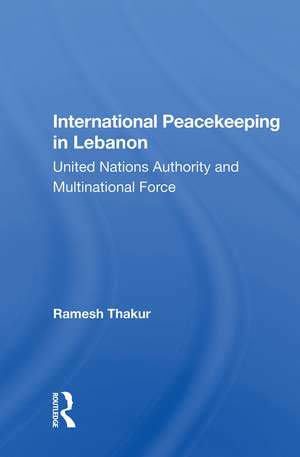International Peacekeeping In Lebanon: United Nations Authority And Multinational Force
Autor Ramesh Thakuren Limba Engleză Hardback – 7 iun 2019
Preț: 764.20 lei
Preț vechi: 1027.40 lei
-26% Nou
Puncte Express: 1146
Preț estimativ în valută:
146.26€ • 152.29$ • 123.60£
146.26€ • 152.29$ • 123.60£
Carte tipărită la comandă
Livrare economică 10-24 martie
Preluare comenzi: 021 569.72.76
Specificații
ISBN-13: 9780367012908
ISBN-10: 0367012901
Pagini: 370
Dimensiuni: 143 x 217 mm
Greutate: 0.45 kg
Ediția:1
Editura: Taylor & Francis
Colecția Routledge
Locul publicării:Oxford, United Kingdom
ISBN-10: 0367012901
Pagini: 370
Dimensiuni: 143 x 217 mm
Greutate: 0.45 kg
Ediția:1
Editura: Taylor & Francis
Colecția Routledge
Locul publicării:Oxford, United Kingdom
Cuprins
Introduction -- United Nations Peacekeeping -- The United Nations Interim Force in Lebanon -- The Multinational Force in Beirut -- Authority -- Power -- Legitimacy -- Force -- Lessons from Vietnam -- Conclusion -- Appendix A: MNF-I -- Appendix B: MNF-II -- Appendix C: United Nations Resolutions
Descriere
Examining the efficacy of U.N. peace efforts, Dr. Ramesh Thakur compares limited peacekeeping through U.N. authority with more coercive means such as the Multinational Force (MNF) in Lebanon. He finds that the role of the U.S.-led MNF coalition cannot be justified in terms of great-power responsibility for ensuring a stable international order, since the coalition has attempted to substitute military power for authoritative peacekeeping. When MNF legitimacy was questioned and authority was challenged, the MNF's use of force in response to those challenges switched the coalition's role from third-party peacekeeper to factional participant. As a result, every successive attempt to strengthen the MNF mandate has further subordinated the concept of neutral international peacekeeping to calculated support of national interests. If reasoned attempts to keep the peace are not to collapse into exercises in national self-interest, then peacekeeping responsibilities must remain with the U.N., supported by the great powers: Only the U.N. can provide an authoritative exposition of values within the context of international society and bestow international legitimacy upon peacekeeping activities; only the great powers can back the U.N. with requisite force.
